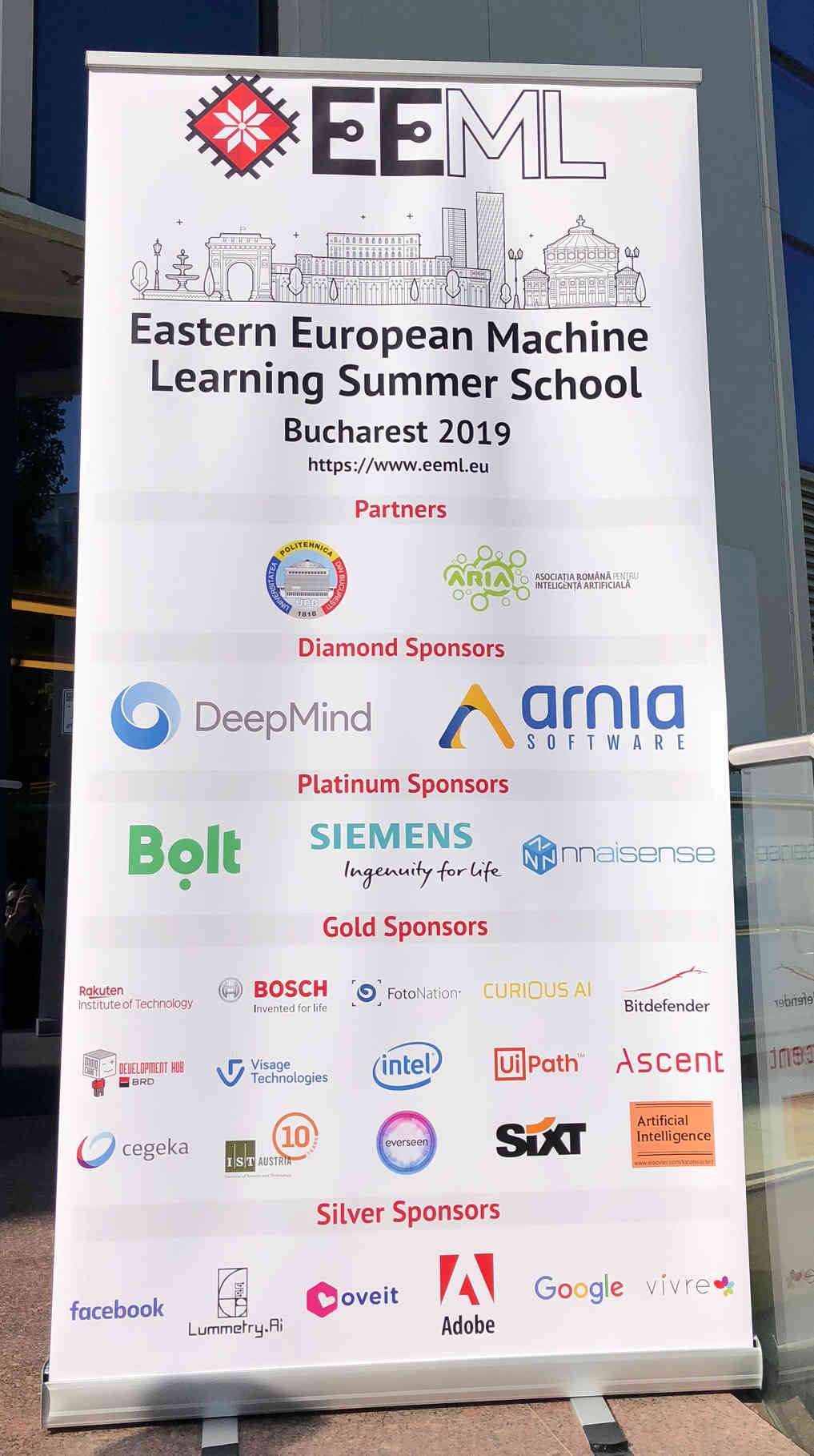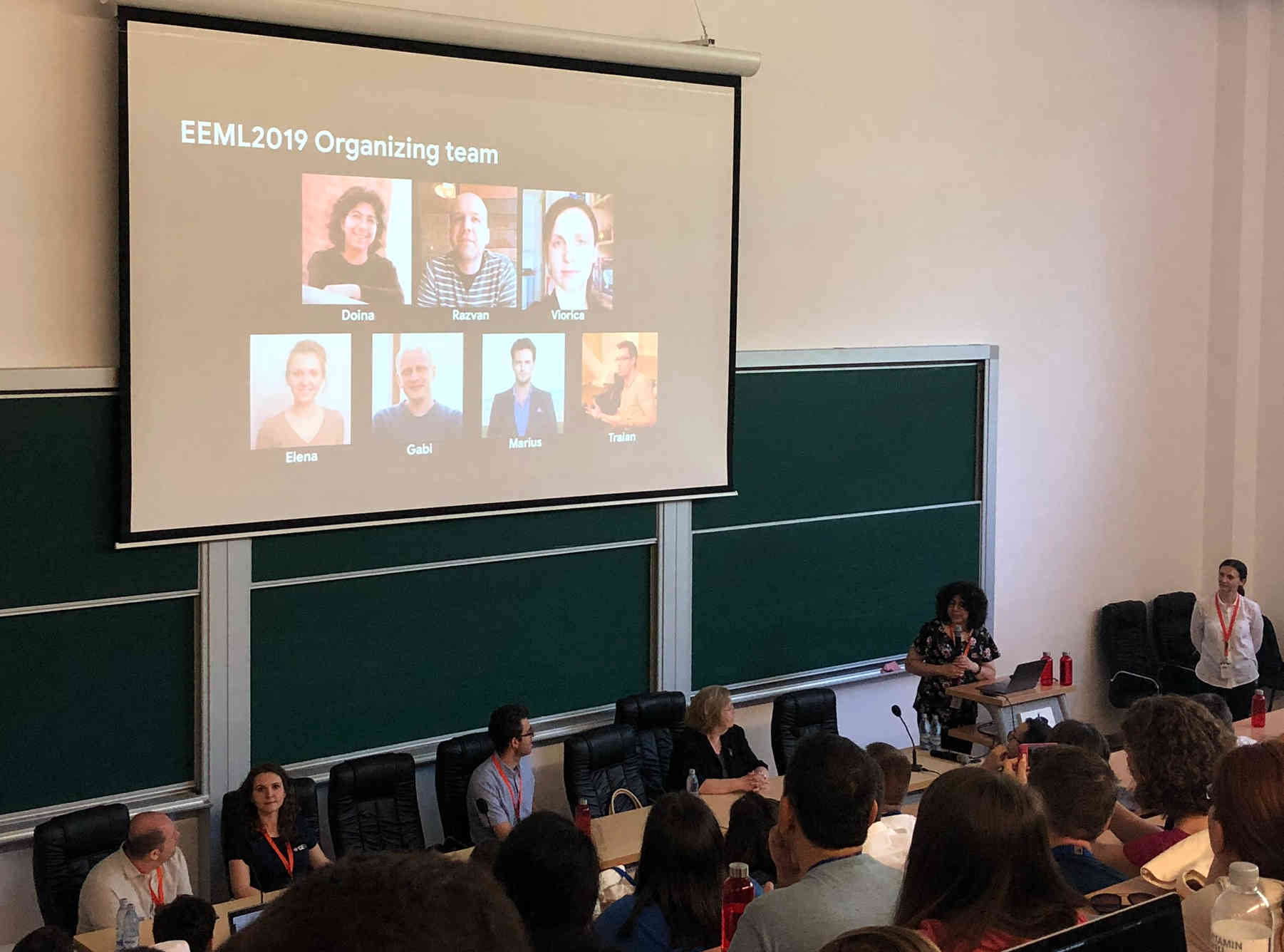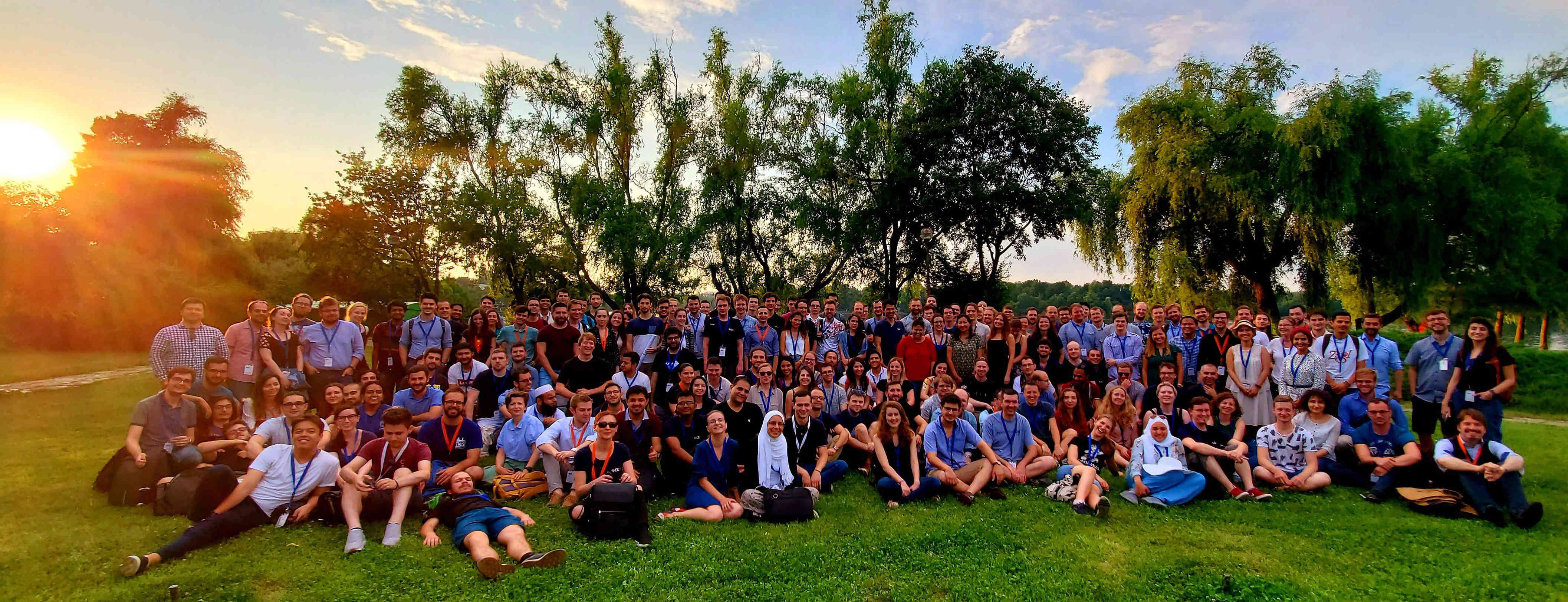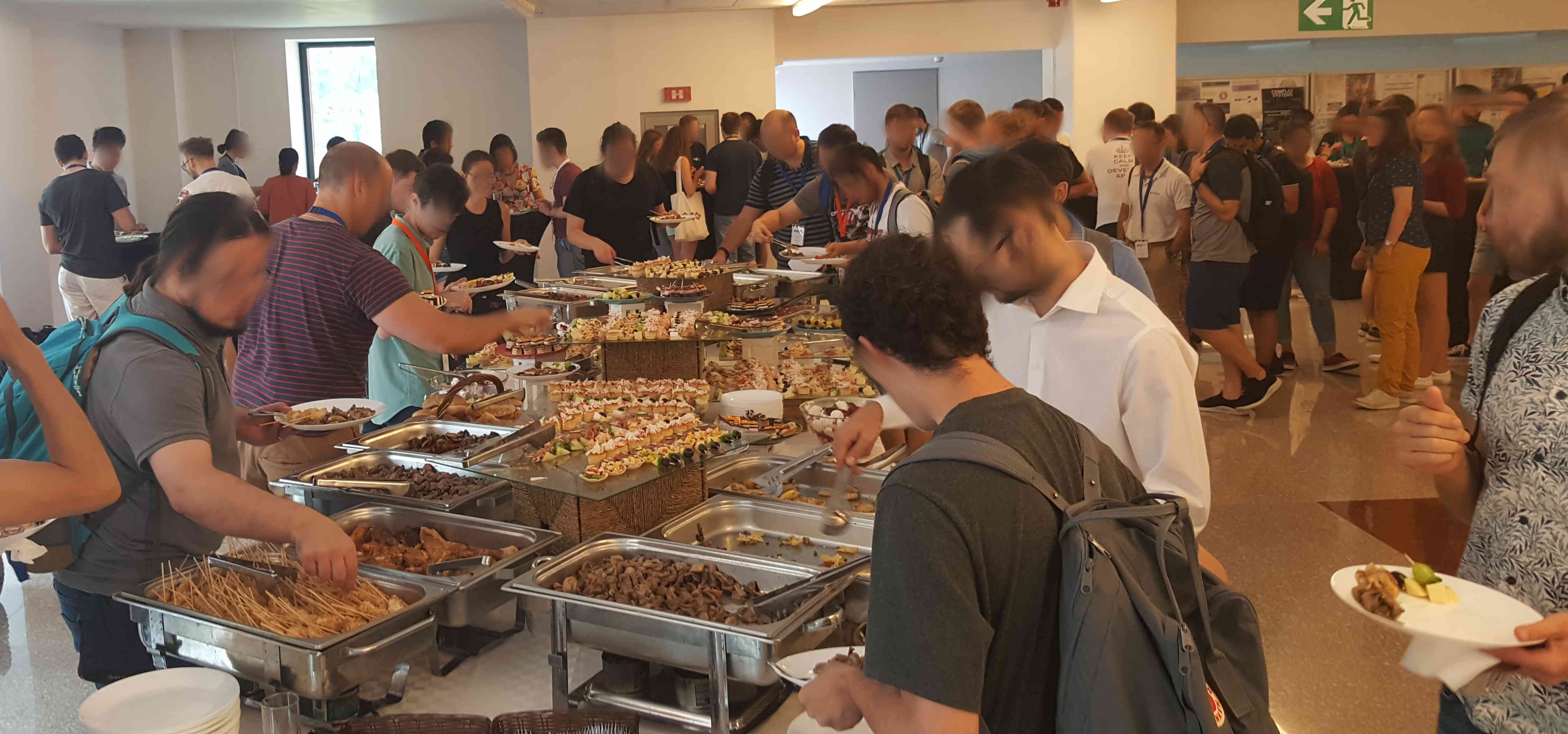Impressions from the Eastern European Machine Learning Summer School (EEML) 2019 in Bucharest (Romania)
Tobias Hinz
08 July 2019
Reading time: 6 minutes
We are proud to announce the 2019 edition of EEML summer school, 1-6 July, Bucharest, Romania. Topics covered: DL, RL, computer vision, bayesian learning, medical imaging, and NLP. An amazing set of speakers confirmed so far! More info coming soon! Check https://t.co/PM3Tn3ox4Y! pic.twitter.com/DZtDRmdQen— EEML (@EEMLcommunity) 12. Dezember 2018
Last week I attended the Eastern European Machine Learning Summer School (EEML) 2019 in Bucharest (Romania). This is the second edition of the summer school after the TMLSS in Cluj-Napoca (also Romania) last year.

The summer school is mainly organized by members of DeepMind, local researchers of the Politehnica University of Bucharest, and A LOT of volunteers. As implied by the name, EEML focuses on topics around Machine Learning and Artificial Intelligence, mostly on the subfield of “Deep Learning” and Reinforcement Learning.

The idea behind EEML is to shine a spotlight on Eastern Europe to emphasize its potential, to provide learning and networking opportunities for participants from all over the world, and to highlight imbalances (e.g. gender and nationality) in the current “average” group of researchers and conferences. As such, the organizers really try to focus and attract talent from both Eastern Europe and under-privileged groups in general.
#EEML2019 welcomes participants from 42 countries everywhere in the world. Let the games begin! pic.twitter.com/Znk8lpGo5I— EEML (@EEMLcommunity) 1. Juli 2019
The audience consisted mostly of PhD and Master students at various stages of their degree, with about 54% of the participants coming from Eastern European countries and the rest from all over the world (in total 42 represented countries).
Eastern European Machine Learning Summer School in numbers - various axes of diversity#EEML2019 pic.twitter.com/pcOSO8hYOq— Piotr Migdal (@pmigdal) 4. Juli 2019
Overall, the EEML program was quite dense and packed with lectures, industry keynotes by the sponsors, practical coding sessions, and social events. In general, a typical day started with breakfast from 8-9am, followed by two lectures, and lunch from around 12:15-2pm. After lunch, there was another lecture, a 30-minute industry keynote, and then a 2-3 hour practical coding session where we applied some of the concepts we learned in the previous lectures. The evenings then concluded either with a poster session (dinner was provided, too) or a social event.
#EEML2019 At our welcome reception, our participants were welcomed by Dr. Ligia Deca, state adviser on Education and Research. Additionally, UPB rector Mihnea Costoiu, dean Adina Magda Florea, director at Google AI Rahul Sutkhankar and our own Doina Precup. pic.twitter.com/dVXilrTpNR— EEML (@EEMLcommunity) 2. Juli 2019
On Monday evening (first day of EEML) we had a Welcome Reception at the Palace Hilton Hotel in the city center. The local volunteers managed to get all 200+ participants to reach the hotel via the Metro and a walk through the city. After some short talks by Doina (one of the main organizers) and others, we had a nice buffet in a beautiful hall within the hotel.
Both Tuesday and Wednesday evenings were reserved for the posters. Here, attendees of the summer school got the chance to present their work and to find out more about what the other attendees are working on. The space was limited which lead to some creative problem-solving in order to fit all the posters on the available boards.
Poster session at #EEML2019 starts now. Thanks @L3viathan2142 who helped me to fix the left floating margin 😅 pic.twitter.com/lUVvGx9i3I— sarnthil (@sarnthil) 3. Juli 2019
On Thursday morning we only had one lecture and one industry keynote before heading out to a social event. We first went for lunch at the famous Caru’ cu Bere and after that took a tour through the Palace of Parliament. The Palace of Parliament is an imposing structure, finished in 1997, and is, among other impressive statistics, the heaviest building in the world (weighing about 4,098,500 tons) and is the second-largest administrative building in the world (after the Pentagon). After this, we participated in the AI for Social Good public session in the National Theatre Bucharest with keynotes by Danielle Belgrave (Microsoft Research) and Piotr Mirowski (DeepMind) about how AI can have a positive impact on our society followed by a panel discussion.
The Dagstuhl Declaration on #AIforSocialGood is now live. It's so important that #ML, #AI and NGOs form deep collaborations for #SocialGood. Really proud to be a part of this and to dialogue with leaders on the intersection of these fields. https://t.co/RY2K2VeHYr— Danielle Belgrave (@DaniCMBelg) 3. Juli 2019
Thank you tremendously @DaniCMBelg, @shakir_za, @JCornebise, @weballergy, @yeewhye, Tom Schaul, Claudia Clopath and many others for writing the Dagstuhl declaration on #AIforSocialGood to enable collaboration between #AI research and NGOs:https://t.co/hKcgZ8ih8m https://t.co/c4sqgsKHdW— Piotr Mirowski (@MirowskiPiotr) 4. Juli 2019
Finally, on Friday night we had a Gala dinner at the Restaurant Pescăruș in the beautiful Herăstrău Park which is where we took our group photo.

Throughout the days we were always provided with breakfast, lunch, and dinner at the PRECIS Center, which is also where the EEML lectures and practical sessions took place.

Another nice effect of having all lectures, practical sessions, and breaks in the same location was that this made it easy to “catch” some of the lecturers to talk to during the breaks. Most of the lecturers stayed for one-two days and mingled with the participants. As such, it was straight forward to approach them and talk with them about their research. Besides being able to talk with the organizers who were always around and happy to answer questions or talk about the latest trends in research I was able to have nice discussions with other well-known researchers such as, e.g., Nal Kalchbrenner, Andrew Zisserman, and Zeynep Akata.
For many of the lectures, the corresponding slides can be downloaded here.
#EEML2019 Here are my slides for the introduction to deep learning lecture https://t.co/XsuUHbcuF5 pic.twitter.com/uZ9zCGGuQo— Razvan Pascanu 🇪🇺 (@rpascanu) 1. Juli 2019
In addition to that, all lectures were very interactive, with plenty of opportunities to ask questions and interact with the lecturer. There was also a nice mix of introductory lectures (e.g. DL by Razvan Pascanu, RL by Doina Precup, CV by Rahul Sukthankar, continual learning by Tinne Tuytelaars) and lectures focusing more on current, state-of-the-art approaches in various research directions (e.g. self-supervised learning by Andrew Zisserman, generative models by Nal Kalchbrenner, few-shot learning by Zeynep Akata, and multi-agent RL by Shimon Whiteson). In particular, I would like to highlight Anca Dragan’s lecture about RL with humans in the loop, which was super interactive.
Informative session on Inverse Reinforcement Learning and it's applications in self driving cars by @ancadianadragan at @EEMLcommunity. Would love to delve further into the topic! #EEML2019 #reinforcementlearning pic.twitter.com/iaJbHx91FW— Asmita Poddar (@asmita_poddar) 4. Juli 2019
The award (from me) for the best slide goes to Shimon during his talk on multi-agent RL.
Key setting for multi - agent reinforcement learning by @shimon8282. #EEML2019 pic.twitter.com/f5ZvTEjFZQ— Petru REBEJA (@petrurebeja) 2. Juli 2019
On all evenings (except Thursday) we had some time to implement and try some of the key concepts we learned during the previous lectures. In the first 30 minutes or so we got a general introduction about what the goal of the respective lab session was. After that, everyone started working on the provided challenges. This was a fun experience to play around with some key concepts and see the effects of different parameters and implementations.
#EEML2019 First two days of labs, introduction to tensor flow and reinforcement learning by our own David and Diana. pic.twitter.com/WyYDYSnaiL— EEML (@EEMLcommunity) 2. Juli 2019
Overall, I must say that I was very impressed with the organization and experience during my week in Bucharest. Organizing an event like this is A LOT of work and the organizers and volunteers put a lot of their free time into this, for which I am very grateful. As a result, the EEML is very affordable, especially since it included food on all days (including three big meals at restaurants/hotels) and a guided tour through the Palace of Parliament. This is because of the generous sponsors and all involved organizers, volunteers, lecturers, and teaching assistants who all donated their time to make this possible. Additionally, we were able to book accommodation in the local student dorms (about 20 min walk from the PRECIS center) at very affordable prices (usually less than 100€ for the week). The communication leading up to and throughout the week was very good, using both E-Mail and Slack to share all important information, news, and updates.
As far as I am aware there are already plans for another edition of the EEML next year. According to rumors it will not take place in Romania, but might take place in Hungary instead (though all of this is hearsay from my side at the moment). Regardless of the final location: if you are at all interested in machine learning and want to learn more about various aspects of it as well as get to know a lot of amazing people working and studying in this field then EEML is definitely the place to go. The atmosphere is amazing, the lecturers are top-notch, and the whole experience is unique and enriching both on a personal and a professional level.
Finally, I would like to again thank the organizers and their amazing work who made all of this possible. This tweet summarizes it quite perfectly.
I'd like to thank all the organizers of @EEMLcommunity for making such a great summer school! Thank you Doina Precup, @rpascanu, Viorica Patraucean, @ilarele, Gabriel Marchidan, Marius Leordeanu, Traian Rebedea, and all the speakers and volunteers! #EEML2019 pic.twitter.com/FTyGILP9I6— Michal Šustr (@michal_sustr) 7. Juli 2019